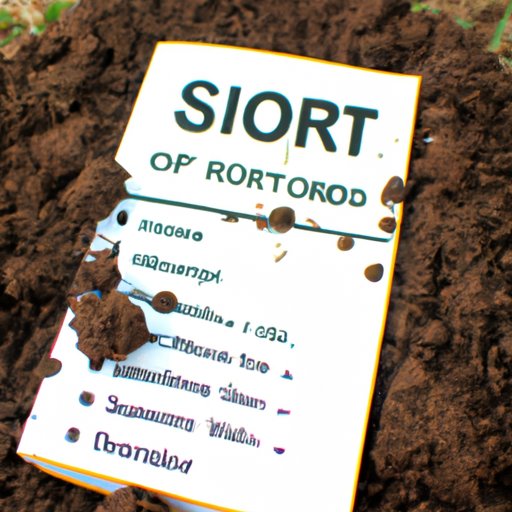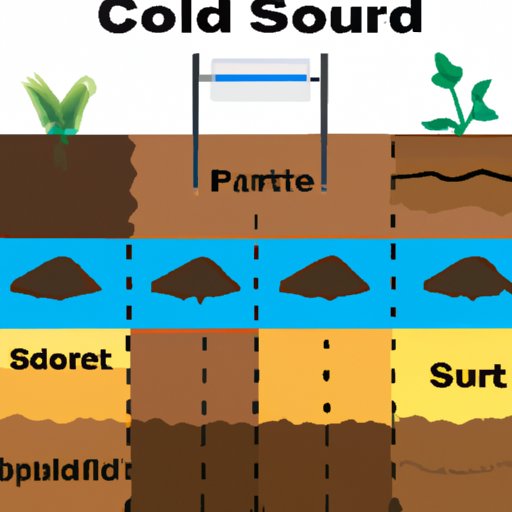Introduction
Soil science is a field of study that focuses on the properties, composition, and development of soils. It is an interdisciplinary field that combines physical, biological, and chemical sciences to understand the processes and interactions that occur between soils and their environment. In agriculture, soil science helps farmers understand how soil affects the growth and development of crops, as well as how to manage soils for maximum productivity.

A Guide to Soil Science in Agriculture
Soil science plays an important role in helping farmers produce healthy and abundant crops. By understanding the properties and dynamics of soil, farmers can make informed decisions about how to best manage their land and resources. Here is a brief guide to soil science in agriculture:
What is Soil Science?
Soil science examines the physical, chemical, and biological properties of soils and their interactions with the environment. Soil scientists study how soils form, how they are affected by climate and land use, how they interact with plants and animals, and how they can be managed for optimal crop production. Soil science has a wide range of applications in agriculture, from improving soil fertility and water management to understanding the effects of climate change and soil degradation.
Benefits of Soil Science in Farming
Soil science offers many benefits to farmers. By understanding the properties and dynamics of soil, farmers can make better decisions about how to manage their land and resources. Through soil science, farmers can improve soil fertility, optimize water management, and reduce the risk of soil erosion and nutrient loss. Additionally, soil science can help farmers identify and address soil-related problems, such as compaction, salinization, and acidity. Ultimately, soil science helps farmers maximize crop productivity and minimize environmental damage.
The Role of Soil Science in Sustainable Agriculture
Soil science plays an important role in sustainable agriculture. The principles of soil science enable farmers to develop practices that are more efficient, resilient, and environmentally friendly. Here is a look at how soil science impacts crop production and intersects with agronomy:
How Soil Science Impacts Crop Production
Soil science has a direct impact on crop production. By understanding the physical, chemical, and biological properties of soil, farmers can identify the most suitable soils for growing crops. Additionally, soil science can help farmers identify and address soil-related problems, such as compaction, salinization, and acidity. This can help farmers maximize crop yields and minimize the need for artificial fertilizers, pesticides, and other inputs.
Intersection Between Soil Science and Agronomy
Soil science and agronomy are closely related disciplines. Agronomy is the science of producing and using crops, while soil science is the study of soils and their interactions with the environment. Together, these two fields can help farmers develop more efficient and sustainable farming practices. For example, agronomists may use soil science to identify the best crops for different soils, while soil scientists may use agronomic principles to develop soil management strategies that optimize crop production.
Conclusion
Soil science is an important field of study that has numerous applications in agriculture. By understanding the properties and dynamics of soil, farmers can make informed decisions about how to best manage their land and resources. Soil science enables farmers to improve soil fertility, optimize water management, and reduce the risk of soil erosion and nutrient loss. Additionally, soil science can help farmers identify and address soil-related problems, such as compaction, salinization, and acidity. Finally, soil science and agronomy intersect to help farmers develop more efficient and sustainable farming practices.
In conclusion, soil science is a crucial tool for farmers looking to maximize crop productivity and minimize environmental damage. By understanding the properties and dynamics of soil, farmers can make informed decisions about how to best manage their land and resources. Through soil science, farmers can identify the most suitable soils for growing crops and develop soil management strategies that optimize crop production.
(Note: Is this article not meeting your expectations? Do you have knowledge or insights to share? Unlock new opportunities and expand your reach by joining our authors team. Click Registration to join us and share your expertise with our readers.)
